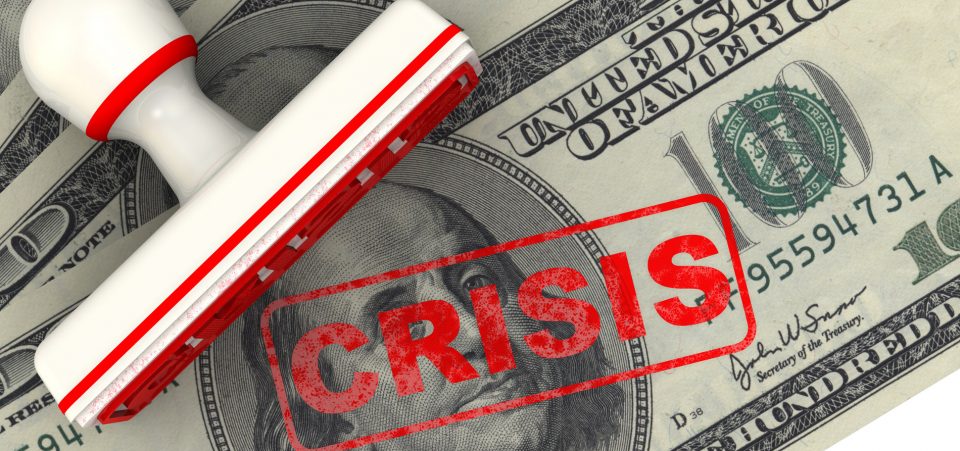President Trump Has Been Forced onto a Path Leading to War and Economic Collapse
The Dow Jones Industrial Average (DJIA) appears to have settled around the 25,500 mark—give or take a few hundred points. The big hemorrhage of value appears to have settled for the time being. The big stock market crash hasn’t happened and the world appears to be edging away from economic collapse. But appearances are misleading. Not all is well on Wall Street. Indeed, not all is well in Washington and in America now. There is much confusion about what is good and what is bad.
You can blame much of the confusion on two disruptive forces that gained strength in 2017. And they’re about to leave an unpleasant mark in 2018. The two forces are interest rates and cryptocurrencies. Interest rates have stayed low so long that even a modest rise, divided into three or four increases in 2018 as Federal Reserve Chair Jerome Powell has hinted, causes uncertainty.
It’s as if everyone has forgotten how the economy functions when interest rates suddenly make borrowing more expensive. What terrifies the market is the fact that many investors will suddenly discover that borrowing to make money in equities may have seemed a good idea “at the time,” but it no longer makes sense, triggering a sell-off.
New Safe Assets That Aren’t Safe and Policies That Aren’t Great
As for Bitcoin and other cryptocurrencies, these have, rather oddly, become a new “safe asset.” Most people who’ve invested in Bitcoin, even the ones who are using dozens of computers in specially dedicated warehouses to engage in the mysterious activity of Bitcoin mining, have no clue. But Bitcoin has gained 1,500% in 2017, so it’s good for making—rather ironically—the very dollars, euros, yen, and yuan that cryptocurrencies are supposed to replace.
The problem with these new “products”—let’s call them that for lack of a better term—is that they’re competing against more traditional safe assets like gold or silver. No doubt, as I write this, some clever people are selling stocks on Wall Street, taking a profit and putting these in Bitcoin, thinking it’s an asset “class” that won’t suffer in case interest rates go up.
If I were to paint a composite of the overall investment universe now, it would look like September 1929 (that is, a few weeks before the big 1929 stock market crash) with an intruder, shaped like a Bitcoin encrusted calf, representing a deceiving diversion away from the one true source of (investment) safety: gold. Safety—or better, the flight to safety—will soon become a household concept again.
No Economy Can Function in Isolation
Regardless of what economic libertarians believe, no economy functions in a vacuum. Economies need structure and rules to work. That’s why it matters what the government is doing.
Policies and approaches—from foreign relations to fiscal rectitude and governance standards—affect how companies perform. In turn, these produce the gross domestic product (GDP) growth we all like that makes markets more confident. But is that the case in the United States, or, in fact, the world now?
As they evaluate his first full year in office, many are blaming President Donald Trump for a general malaise in America. Yet, few are experiencing it where it matters: in their wallets. Somehow, the tickers pointing to Dow Jones records in the first few weeks of the year have generated a false sense of security, even for those who have little to gain from this: the majority.
Trump is not really to blame for the malaise. He inherited what was already a flawed machine when he was sworn in in January 2017.
Wall Street’s performance sets the tone for investors worldwide. A shift in sentiment that brings down the Dow Jones indicator triggers a domino effect that reaches stock exchanges all over the world. The opposite is less true.
Wall Street dominates. But such financial power and economic importance don’t stem from thin air. The United States has thrown around real political and military power in the world to reap the economic benefits. And this is where Trump is slipping. The United States’ role in the world is changing.
Hillary Clinton would have pursued a more familiar version of the empire, pretending to be spreading democracy. But Trump has not shunned the idea of the United States as a supreme power; he’s projecting it. And he’s pushing it too far from the shore to the point that it has been lost, and new beacons—or points of reference—are replacing it.
Trump Is Over-Exposing U.S. Power
It’s almost as if Trump has over-exposed U.S. power. And it’s going to backfire. All empires and great powers make this mistake. That’s why no great power has lasted.
Rome once dominated the world. Now it’s the capital city of a medium-sized European country, which, despite being one of the eight richest economies in the world, is still reeling from the damage that the 2008 recession caused. The Persians, the Indians, the Austrians, the Germans, and the British had their empires too. They all crumbled. Sooner or later, it had to happen to the United States.
Rarely are “imperial” collapses linear, and rarely can they be attributed to a single cause or a single ruler.
President Trump has done things a little differently from candidate Trump.
We’re Already in a New Cold War
Ever since Trump won the 2016 election, the Democrat and Republican establishment—ever more “seamless” and represented by such people as Hillary Clinton and John McCain (as well as David Frum, Bill Kristol, and the Washington think tanks)—has been trying to sever relations with Russia.
Some may argue successfully that this establishment, which represents what is called the “Deep State,” wants to resume the Cold War where Gorbachev and Yeltsin left it.
U.S. intelligence agencies, spurred on by the likes of the Hillary Clintons of the world and the neoliberal thinkers in D.C., are driving the “Russiagate” narrative to its logical conclusion: conflict. Despite flimsy evidence like “13 Russians trolling pro-Trump (and some pro-Clinton) ads on Facebook after the 2016 election,” President Vladimir Putin remains the quintessential villain. The mainstream media paints him as some kind of James Bond 007 villain à la Spectre, echoing the establishment’s views. (Source: “Russiagate Suddenly Becomes Bigger,” The UNZ Review, February 20, 2018.)
The fact that Syria remains a disaster is one of the first effects of this policy. Trump wanted to stay away. Instead, like Don Corleone’s rivals in Godfather III, foreign conflicts from the Bush and Obama eras are “pulling him back in.” And they’re pitting the U.S. and Russia ever closer to a collision course.
China, which is the one true emerging power that’s already challenging the United States, is set to become the world’s No. 1 economy by 2050. Yet, it benefits from the growing tensions between Washington and Moscow.
The new Cold War, already in full swing, isn’t going to be cheap. The United States is doubling down on military spending. Budgets are ballooning and could divert funds from Trump’s much-talked-about infrastructure rebuilding program. Yet, the taxes to pay for all the bellicose spending have dropped. It’s inevitable that the government will have to cut more and more programs to feed the war machine.
It’s good news if you’re Lockheed Martin Corporation (NYSE:LMT), but it’s bad news if you’ve lost your job or medical assistance. It’s also bad news if you want to ensure that America’s trade deals work or that the dollar maintains its purchasing power and that interest rates don’t rise to levels that could heavily cut into economic growth.
Trump Gets a Harsh Lesson About Presidential Powers
Perhaps, Trump’s biggest mistake was—and may still be—to think that as president, he could change things. But, “making America great again” isn’t a one-man job. President Trump, like many who preceded him, does not have all the answers, tools, and solutions to solve the multitude of problems that a country like the U.S., with its unique global leadership role, must face.
President Trump has already gone off course. So far, the only achievements about which he can boast is recognizing Jerusalem as Israel’s capital and getting ambitious tax cuts passed. The super rich, whether they voted for Hillary Clinton or Donald Trump, got, to quote the man himself, a “great deal.” But most Americans got little or nothing. Perhaps the lucky ones working for solvent corporations got a one-time bonus. But compared to what the super-rich and corporations get, it’s nothing.
The markets got something as well. They got inflation jitters, which persist and are prompting what might well be a premature interest rate “hiking” season, activating dangerous market mechanisms like panic selling.
Meanwhile in China…
Poignantly, in pursuing policy goals set by those really in power, Trump is showing his main rivals that he’s weak. Almost as if to mock him, President Xi Jinping of China wants to change the Constitution to become, for all intents, president for life. (Source: “China paves the way for President Xi Jinping to rule for life,” Vice News, February 26, 2018.)
This would make Xi as powerful—in theory—as the late Mao Zedong. Chinese democratic prospects may not look good, but the stability of the Chinese economy does. China is quickly rising from mere economic power to global superpower. So long as prosperity increases, Xi has little to fear from his people as far as opposition now.
But, doing away with term limits establishes continuity, making China an even more attractive place for business. The opposite is happening in Washington. Investors are realizing that the White House has little influence or consequence.
Had Trump held firmly to his personal stance, pursuing closer ties to Russia, the global picture would be rather different today. Military budgets would be more contained, and the government would have more money to spend on what most Americans need. They don’t need more wars, much less risk a major one against Russia.
Instead, Trump is being pushed. And he will make mistakes. Whereas, since World War II, U.S. foreign policy served as the main tool to consolidate Washington’s position of global pre-eminence or dominance, if you will. Trump has already shown that Washington can no longer fulfill that role. Trump will try to spend his way to challenge Russia and China, but sooner than later, it will go bankrupt and leave only economic collapse behind.





